Ryan Giggs: Manchester United legend’s journey to Wales leadership
- Published

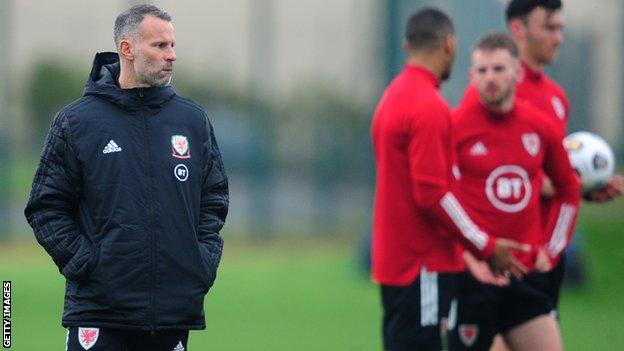
Giggs, 46, was appointed Wales manager in January 2018
When Ryan Giggs said he was enjoying his "first year without football" in 2017, he explained what he'd been doing during a supposed sabbatical from the sport.
There was TV punditry, work with Uefa as a technical observer and the running of Salford City.
"You find out there's a whole big old world out there," Giggs said without a hint of irony in a London hotel where he was endorsing a grassroots coaching venture from one of his sponsors. He'd also been playing futsal, he added, and watching his son play, too.
For a year without football, there seemed to be a lot of football.
Giggs, then aged 44, was referring to a break from the professional game to which he had committed more than half his life - as a player and coach. It was telling how consumed he was by the sport even during his brief hiatus of sorts.
This was an insight into the mind of a football obsessive, a Manchester United legend who made his debut in 1991 and retired 23 years later, before making the transition to the dugout and aiming to prove himself anew. Six months after that day in the London hotel, he was named Wales manager.
Despite his iconic status at Old Trafford, Giggs' appointment by Wales was divisive. Many fans remained sceptical, a few were even resentful over a perception Giggs had tended to put club before country in the past.
The former captain said on the day of his unveiling that the only way he would change minds would be by winning games. Having since led Wales to qualification for just their third major tournament, the tide is duly turning.
Next summer's European Championship looms large on the horizon but for now Giggs - still a work in progress, like his young side - turns his attention to Thursday's friendly against England.
The man who graced Wembley as a player in FA Cup and Champions League finals is back in his new guise, a manager a lifetime in the making.
This is how he got there.

Giggs' ascent as a player is a story well told, from his United debut as a 17-year-old, to quickly establishing himself as an electrifying left winger, to the 963 first-team appearances he made between 1991 and 2014 - a club record.
The potential was always obvious, even in the early years, but those around Giggs back then could also sense the temperament of a future manager.
"Everyone was in awe of him," says former Northern Ireland international Keith Gillespie, who graduated from United's youth ranks alongside Giggs as one of the 'Class of 92'.
"Despite him only being a year older than us he was someone everyone looked up to. He was the one we wanted to emulate.
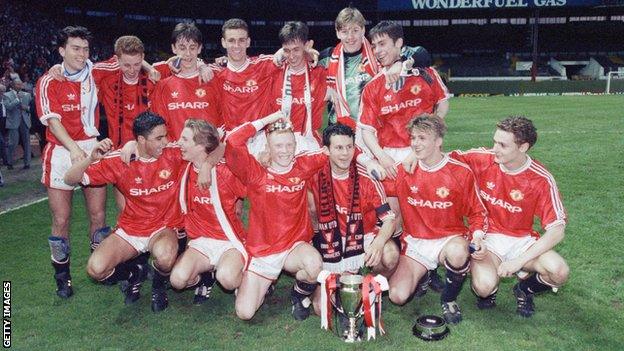
Manchester United's FA Youth Cup team of 1992 - Giggs is third from right in the bottom row
"When you had someone like Sir Alex Ferguson, he wouldn't let you get ideas above your station. That's instilled in you, but I think Ryan was very level-headed from the start. I don't think he would be the kind of manager who'd be coming into the dressing room and throwing teacups though. He's a little bit more relaxed than that."
The coolness remains. Giggs is an analytical thinker, measured about his decisions and softly spoken when he delivers them. He is not particularly close to his players - a stark contrast to his gregarious Wales predecessor Chris Coleman - but he is perfectly polite and approachable.
Even as a youth player, Giggs was often reserved to the point of shyness - but when he spoke people would listen.
"Because he was aware of what was going on around him, he didn't open up to many people", says Robbie Savage, an early United team-mate and future partner in the Wales midfield.
"Did I ever think he would become a manager? I listened to his team talks when I was playing for Wales and it was awe-inspiring."
It is striking that Gillespie and Savage - in separate conversations - both mention the "awe" Giggs could invoke. He carried that quiet authority into United's first team of the early 1990s, where Bryan Robson and Paul Ince were among the dominant characters.
In such an imposing environment, Giggs' relatively unassuming presence might not have marked him out as an obvious manager in the making - but still his senior team-mates saw something.
"Most people think it's the ones with the biggest personalities, the loudest ones in the dressing room, the captains who go on to become managers - but that's not the case," says Mark Hughes, who played with Giggs at United and Wales, before managing him at international level.
"A lot of the guys in the dressing room are thinkers who understand the game really well and are always thinking about it, away from the training ground as well. Ryan was very much in that mould and you sense that he's got a real understanding of football.
"He was a very mature young man and, even in those days, he was very aware of what he wanted to do and where he wanted to go in his career."
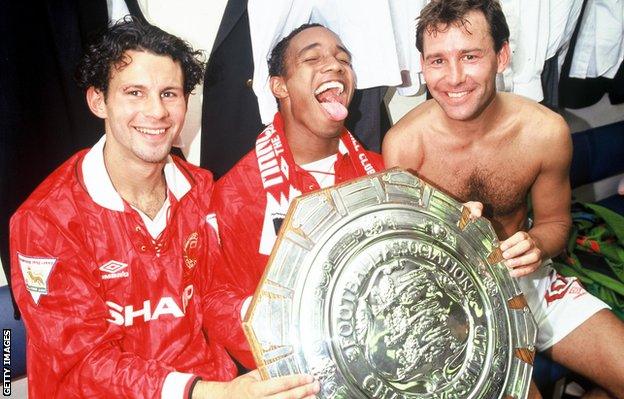
Giggs, Paul Ince and Bryan Robson celebrate after beating Arsenal on penalties to win the 1993 Charity Shield
Giggs' United years brought huge success. Thirteen league titles, four FA Cups, two Champions League winners' medals and countless individual accolades along the way. As he continued to pull the strings in midfield well beyond his 40th birthday, some might have wondered if he was ever going to retire.
But while he adapted his playing style to prolong his career, Giggs was also planning for his future in coaching - studying for his badges and also studying those around him.
His first mentor had been Sir Alex Ferguson, whose dynasty at Old Trafford meant Giggs played under only one manager until he was 39 years old.
David Moyes was the second and lasted less than a season. After he was sacked in 2014, Giggs took charge of United as interim player-manager for four games.
It was an overwhelming introduction to management for Giggs, who admitted to breaking down in tears after his final game, such was the intensity of the job and the emotional toll of leading the club to which he had devoted his entire life.
And yet he wanted more. He likened the experience to a drug and said his brief tenure had reaffirmed his desire to become a manager.
He oversaw two wins, one draw and one defeat in his four matches and when Louis van Gaal was appointed United's permanent manager that summer, the Dutchman named Giggs as his assistant.
Van Gaal, who had recently guided the Netherlands to third place at the 2014 World Cup, boasted a stellar record in club management. He'd won league titles in his homeland, Spain and Germany and led a thrilling young Ajax side to Champions League glory in 1995.
Not unlike Ferguson, he was as renowned for his forthright manner as his strong footballing principles. In Giggs, he saw a potential successor.
"He was very open and wanted to learn a lot, which is not usual for a former top footballer," Van Gaal recalls.
"Because he played for Manchester United for years, he immediately had a lot of respect from everyone. His verbal ability, perhaps from a fear of being too obvious, played him down in the beginning.
"He is an open and inquisitive person, who is very nice to deal with."
Giggs was by Van Gaal's side for the next two years, sitting next to him at games, consulting him during training sessions and picking his brains whenever possible.
Although United won the FA Cup in 2016 and Van Gaal gave youngsters such as Marcus Rashford their debuts, his two seasons at Old Trafford were generally viewed as underwhelming.
For Giggs, it was a precious opportunity to learn from a vastly experienced and successful manager who he considered a "teacher". Although Van Gaal saw it differently.
"I didn't feel that way and I didn't act like that towards him," the now retired Dutchman responds with typical bluntness.
"He would be trained as a successor to me."
Van Gaal's expectation, and that of many others, was that Giggs would be the club's next manager. When Van Gaal was fired, two days after that FA Cup win at Wembley, Jose Mourinho was appointed and Giggs left.
For the first time in his career, as a player or coach, Giggs found himself out of work.
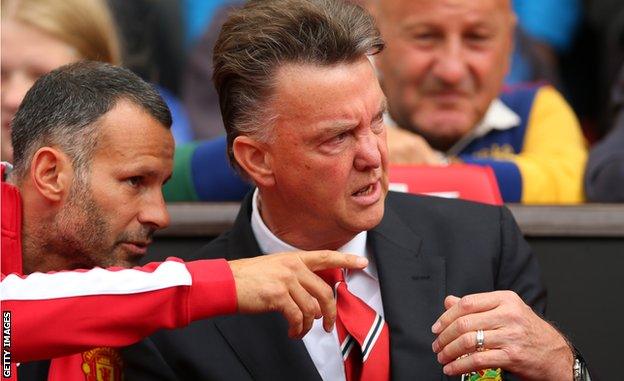
Giggs and Van Gaal worked together for two years before the Dutchman's sacking also saw Giggs leave United
A few months later, in October 2016, he was interviewed for the Swansea City job before they appointed Bob Bradley, who lasted just 85 days.
Giggs was irked not only to have been overlooked, but to have found out in the media rather than from the club.
He decided to take some time out, the aforementioned "year without football", but it soon became clear he could not live without the sport - and there was one job to which he had long been linked.

Wales had wanted Giggs as their manager for years.
That aspiration was put on hold while Chris Coleman took the team to historic new heights at Euro 2016 but, once he had signalled his intention to step down after the 2018 World Cup campaign, Wales renewed their interest.
When Coleman left for Sunderland in November 2017 following a failure to qualify for the World Cup, the Football Association of Wales (FAW) interviewed his assistant Osian Roberts and former Wales internationals Craig Bellamy and Mark Bowen, as well as Giggs.
The other candidates all had their supporters within the FAW's corridors of power but Giggs was the overwhelming favourite and his appointment was confirmed in January 2018.
Ferguson and Van Gaal's influences were immediately apparent, with Giggs demonstrating his eye for tactical detail and commitment to developing young players. In his 21 matches to date, he has handed out 18 debuts.
There are also echoes of Giggs' mentors in his stylistic ideals - and he is similarly unafraid to make tough decisions.
It was an unenviable task succeeding Coleman, the first manager to take Wales to the semi-finals of a major tournament and loved by the players, who had pleaded with him to stay. His team was gilded like no other in Welsh history and, while Giggs wanted to retain much of its core quality, he also saw the need to evolve.
Captain Ashley Williams and left-back Neil Taylor played prominent roles at Euro 2016 and had long been regarded as permanent fixtures in the Wales squad - until Giggs arrived.
It was nothing personal. He merely wanted to build for the future, and Williams and Taylor soon found themselves out of the picture.
Former captain Williams, 36, describes the decision as "tough" to take but adds: "The manager is going to pick a team he thinks will win a game and I've been in football long enough now to know you respect that."
Taylor, 31, says he "fully understands what Giggs is trying to do, which is bringing those young lads through".
He adds: "Every single one of us at the Euros got our chance from John Toshack and Gary Speed [former Wales managers] so he's done it as well."
Qualifying for Euro 2020 was a struggle at times - with two defeats from the first three matches - but securing Wales' place at the finals of a major tournament for only a third time was vindication for Giggs.
"You judge him on qualification and he's done it," says Savage.
"There was one point when we lost in Hungary and it looked hard. But the players responded and it was amazing."
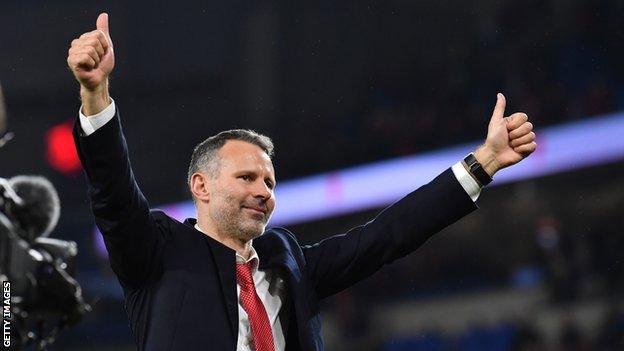
Wales secured a place at the European Championships by finishing second in their qualifying group, behind Croatia
Giggs had been his usual inscrutable self on the touchline throughout the campaign but, when qualification was secured with last November's home win over Hungary, he let his emotions show.
There were tears in his eyes as he saluted Wales' jubilant fans, some of whom had been stinging in their criticism of him as a player and initially resentful of his appointment as manager.
But the ill feeling melted away on that crisp autumnal evening, with the sceptics won over and Giggs finally accepted by his countrymen.
"There was a lot of questioning about Ryan, in terms of his commitment to the cause, but that was never in doubt," says Hughes.
"He's a very proud Welshman and he's got rid of that negativity now.
"You saw how delighted he was when the lads qualified. I was at that game and they were magnificent. You could see the joy in Ryan's face.
"At times he keeps himself to himself. A little bit like myself, he doesn't show his emotions too much, but you saw emotions when we qualified for the Euros this time around. I think that endeared him to a lot of people."

Football X Music playlist: Listen to your team's curated pre-match tracks
Freddie Flintoff: England star talks to Headliners about his battle with bulimia
